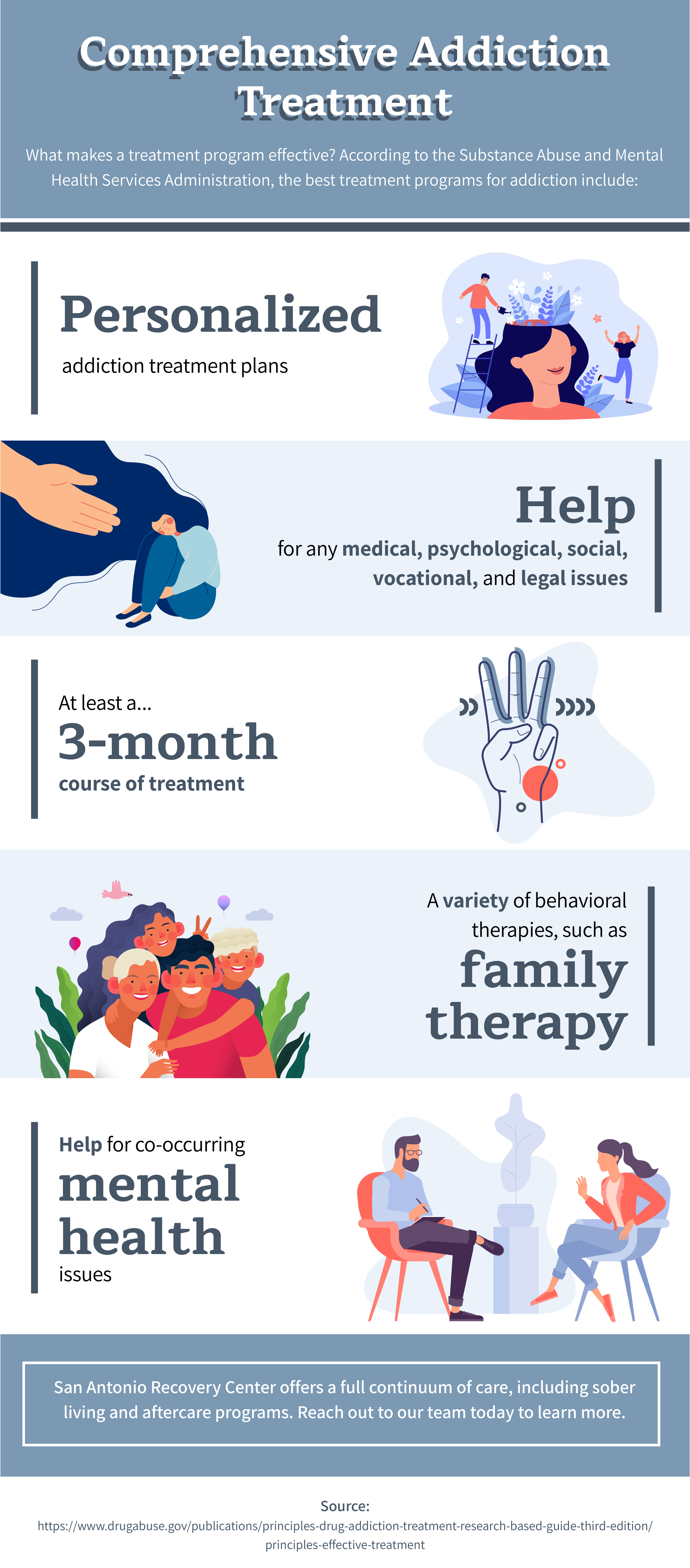
Drug and alcohol addiction affects people from all socioeconomic classes and locations. At San Antonio Recovery Center, we’ve helped individuals from Texas and beyond heal from the effects of substance use disorders and make lasting changes in their lives. If you or a loved one is struggling with addiction and co-occurring mental health issues, we can help. In our recovery center, we offer residential treatment as well as outpatient care. One way we promote lasting sobriety is by offering sober living homes for those who are transitioning between levels of care.
In our sober living homes, residents can focus on developing healthy coping skills and strategies for relapse prevention in a supportive environment. If you think that a sober living residence could help you on your journey to recovery, reach out to the San Antonio Recovery Center team today at 866.957.7885 or connect with us online to learn more.

Sober living homes, which are sometimes also called recovery residences, are a form of transitional housing for those who are in treatment for substance use disorders. They can serve as a bridge between inpatient treatment and outpatient treatment. Sober living homes provide temporary housing--residents might live there for a period of several months as they work to rebuild their lives in recovery.
For many who are working to overcome substance use issues, transitioning between residential and outpatient care can be challenging. This transition often involves moving between living in a structured environment where you have a high level of support and accountability to a living situation with a great deal of freedom. The relapse rates for those in recovery from drug and alcohol addiction can be as high as 60%. Many individuals relapse because they struggle during the move between a structured living environment and a living situation with more independence. Sober living is an option that can make this transition easier.
In sober living homes, residents live with others in recovery and participate in ongoing therapy or group meetings. The rules for each residence can vary. At San Antonio Recovery Center’s sober living homes, we require residents to take drug tests in order to keep our patients accountable.
Not sure whether sober living is right for you? To determine if you’re a candidate for this program, ask yourself the following:
If you can answer “yes” to any of the above, you are likely a good candidate for a sober living residence.
San Antonio Recovery Center patients can easily transition to our sober living homes after inpatient treatment. Sober living can be especially beneficial during our Intensive Outpatient Program as each patient transitions back to a more regular routine. Our treatment programs provide the right support as our patients move between different levels of care on their path to long-term recovery.

Why do we offer sober living in San Antonio? While sober living homes are not a type of addiction treatment, they do complement the programs that we offer. Sober living homes are a source of support, structure, and accountability on the road to recovery. Instead of going straight from a residential program to total independence, our clients can take careful steps towards that goal with help every step of the way.
Our sober living programs, like our addiction treatment programs, are designed around each individual's recovery needs. To this end, we offer women's sober living programs to provide women with the benefits of women-only recovery environments.
Some of the benefits of sober living include:
Sober living homes also help residents commit to a rehab aftercare program, including individualized relapse prevention plans. Developing these plans while in treatment is one thing, but putting them into practice can offer a different set of challenges. Sober living helps individuals in recovery deal with stress and other triggers in a healthy way with a high level of support. Those who face difficulties during this transition can easily access the care they need.

It can be helpful to know what to expect before entering into a sober living home. In these homes, residents are not completely on their own. Instead, they have support from a house manager who works to maintain a structured living environment. Residents are expected to do some or all of the following:
Failing a drug test does not mean that you cannot be successful in recovery. Instead, it’s a sign that you would benefit from continued treatment, which might include a return to a higher level of care. Participants in San Antonio Recovery Center’s sober living program can easily transition back into residential treatment as necessary.
Residents might also participate in regular activities with their housemates. These sober activities can help those in recovery learn how to enjoy themselves without relying on drugs and alcohol. Each resident will have the option to participate in a 12-step program or other recovery support system. Developing a solid network of support is one of the most important parts of living in a recovery residence, and these activities can help housemates get to know each other. Positive friendships can be a motivating force on the path to lifelong sobriety.
Since sober living homes are designed to act as a bridge between treatment and everyday life, residents are expected to look for work and housing while living in a recovery residence. Residents can come and go without many restrictions, though there might be curfews as well as group meetings that they are expected to attend.
Having a plan in place for relapse prevention is essential for those who are transitioning out of inpatient treatment. Sober living homes can be a helpful part of relapse prevention plans, but they’re also just a temporary stop on the road to long-term recovery. Relapse prevention plans can help you navigate triggers that you might encounter. Some of these triggers can include:
While in sober living, you can work on using your new healthy coping skills in everyday life.
When is it time to move out of sober living? This transition will look different for each resident, but there are a few ways to know that you’re ready to move out on your own. Some of the signs that you are stable enough to leave a recovery residence include:
You have a strong network of support outside of sober living, which might include family, friends, or a support group
It’s essential to stay in sober living until you have a support system and relapse prevention plan in place. For many in recovery, stress is a trigger for relapse. Financial worries can make relapse especially tempting, so having a steady source of income and structure for your day-to-day life can be incredibly helpful.
Our rehab center in San Antonio welcomes local clients who prefer to stay in familiar settings, as well as those from Texas and beyond looking for quality, accessible treatment.
We believe in the 12-step philosophy along with offering a full spectrum of care. Addiction impacts the entire body, which is why our compassionate professionals address each client’s mental, physical, and emotional health. We also believe in treating the family unit as a whole because we understand the damage addiction can do. Family therapy is an integral part of our approach to treatment and can help those in recovery build an effective network of support outside of our treatment center.
Some of the programs and services we offer in our treatment center include:

If you’re ready to break free from drug and alcohol addiction, reach out to our treatment team today. At San Antonio Recovery Center, we help our clients on the road to long-term recovery and offer support every step of the way. Whether you’re reaching out for the first time or are working towards sobriety again after a relapse, our compassionate team will help you reach your goals.
Our sober living residences can be an invaluable asset as you work to heal from addiction. Don’t put off asking for help. Contact San Antonio Recovery Center at 866.957.7885 or connect with us online today to learn more.
contact us now!
